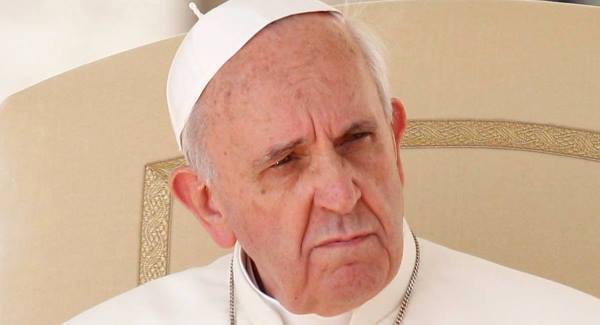Intrepid papal tailgater, Austen Ivereigh, reports here at CRUX on Pope Francis’ speech at Chile’s pontifical university. At the beginning of the article Ivereigh trumpets that “Pope Francis on Wednesday night gave one of the smartest addresses of his pontificate, one that gives Catholic educational institutions a clear direction for our times.”
Maybe I am getting dozy in my old age, but in reading the article it seemed to me that if this was one of the Pope’s smartest speeches I wouldn’t want to read his dumber ones. I realize that much can be lost in translation, and I also realize that Ivereigh himself is rather fuzzily cerebral in his approach. He often unknowingly assumes the lofty air of the English middle class academic, but even allowing for these human foibles, Ivereigh’s article does not help to elevate Pope Francis’ message.
The pope rightly criticizes an increasingly individualistic, technology centered, globalized society and calls for the university to challenge this:
The mission of the university, in this context, is to generate what Francis called “educational processes that are transformative, inclusive and which foster coexistence.” That sounds fairly banal, but Francis makes clear that by “processes” he doesn’t mean content, but teaching a new way of reasoning and thinking “in an integrated way” – a forma mentis.
The term he uses for this in Spanish is alfabetización integradora, a new kind of literacy that enables people to think in an integrating way.
He goes on to explain what he means – “how to reflect on what we are feeling and doing; to feel what we are thinking and doing; to do what we are thinking and feeling” – but a clear account of what this will look like is not the speech’s strongest suit. As so often with Francis, it is thrown out as a deep intuition, but left for others to develop.
This is the pope’s finest hour, but Ivereigh says the speech was banal and “a clear account of what this will look like is not the speech’s strongest suit.” Yes. In fact the idea itself that our thoughts, feelings and actions should be interdependent and consistent isn’t really that stunning is it?
Couldn’t the whole idea be summed up as “Practice what you preach”?
Perhaps I am being unfair, and it is difficult to judge a speech in another language simply by a news report, but it strikes me that “how to reflect on what we are feeling and doing; to feel what we are thinking and doing; to do what we are thinking and feeling” just sounds like the sort of gobbledegook we usually hear from an elderly sister in a pantsuit at one of those painful “retreats” where they wear sandals and serve tofu for lunch.
Austen then goes on to the Pope’s second idea;
… the university’s forma mentis should be at the service of “national coexistence”, becoming what he calls “a laboratory for the future of the country” – one that “embodies the life and progress of the people”, and which can “overcome every antagonistic and elitist approach to learning.”
Yes, but this is a pope and he’s speaking in a pontifical university. Is there nothing to be said about the Catholic faith, the preaching of the gospel of Jesus Christ, the cultivation of Catholicism and the evangelization of culture? Perhaps it was there, but Ivereigh didn’t fit it into the article, and yes, I did not read the text of the pope’s speech so let’s give him the benefit of the doubt.
However Ivereigh himself is nervous about the statism implied in the pope’s “clear direction for our times.”
To Anglo-Saxon ears, the idea of a university at the service of a national agenda will sound dubiously authoritarian, the kind of language used by Generals Franco or Perón in the 1950s.
But then he jumps to explain further:
But Francis’s assumption is that the nation-building mission of a university will be a heroic, even prophetic action, in a future in which the state is largely powerless before the forces of global technocracy.
Yes, perhaps, but what does this mean? Does it mean a heroic proclamation of the gospel in the face of tyranny akin to the surge of grass roots student and intellectual uprising we saw in Poland under the inspiration of JP2? Does it mean a courageous, heroic and unashamed Catholicism proclaiming in word and deed that Jesus Christ is the answer–a joyful call to “open wide the doors to Christ!”
Not really.
Austen continues by quoting Pope Francis:
“This prophetic role demanded of us prompts us to seek out ever new spaces for dialogue rather than confrontation, spaces of encounter rather than division, paths of friendly disagreement that allow for respectful differences between persons joined in a sincere effort to advance as a community towards a renewed national coexistence.”
Oh.
After starting with a bang, Austen ends with a whimper, commenting on the pope’s vision,
As a slogan, it might take a little tightening. But no one can say the pope hasn’t given Catholic universities a mission.
Really?







I am lifelong Catholic, and I love the Catholic church. However, I am not a fan of the present Pope. So I will not comment on his latest gobbledegook.